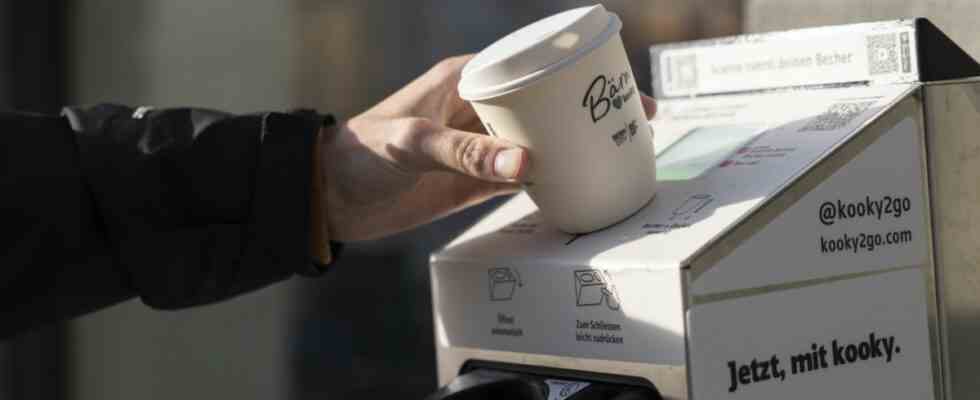Coffee-to-go in disposable cups, many people find that very practical. But convenience has its price: According to the Federal Environment Agency, 2.8 billion disposable cups are used throughout Germany every year, which corresponds to an average of around 34 cups per person per year and causes around 28,000 tons of waste during this period – 77 tons per day.
In order to stem the flood of rubbish, the federal government tightened the packaging law at the beginning of the year. Cafés, bistros and restaurants must now offer reusable containers as an alternative for all single-use cups and all single-use plastic food packaging. However, the obligation has led to a multitude of systems. There are reusable suppliers such as Recup, Vytal and Relevo, and Starbucks, Edeka and McDonald’s have also introduced their own reusable cups, which can then only be returned in their own branches.
Pilot project in Bern
“We have been experiencing an invasion of reusable providers in Germany for months,” says Torge Barkholtz, founder and managing director of the Swiss start-up Kooky. It has set itself the ambitious goal of making the reusable cup almost as practical as the disposable cup.
In autumn, the company started a pilot project in cooperation with the city of Bern. For a deposit of one Swiss franc, customers in the Bernese branches of the start-up’s partner companies can have their hot drink filled into a reusable Kooky cup. These include the supermarket chains Coop and Migros, the bakeries Reinhard, Bakery Bakery and Brezelkönig and the café chain Caffè Spettacolo – a total of 60 sales outlets. After the purchase, the customer has to scan the QR code on the cup using the Kooky app and enter their phone number there once. He then gives the cup back to one of the return boxes that Kooky has set up all over Bern city centre, at train stations and in shops.
When the cup is returned, the intelligent box scans the QR code of the cup, then automatically opens a flap into which the cup and lid are placed. The deposit is then electronically credited to the customer. If the return box is full, a Kooky employee comes by on the e-bike, empties it and takes the used cups to a cleaning company, where they are rinsed. The clean cups are then put back into circulation. “If a cup has gone through the cycle 18 times, its ecological balance is already better than that of a disposable cup,” says Kooky founder Barkholtz. In total, however, a cup can be used up to 120 times.
The city administration is satisfied so far
Sven Gubler, who negotiated the cooperation with Kooky for the city of Bern, is satisfied with the start of the pilot phase. “So far we’ve had a reusable use of five percent, at the end of the two-year pilot project we want to reach ten percent.” In some sales outlets, every fourth hot drink is already served in a reusable cup. The city of Bern wants to set up return boxes throughout the city in the next few months. Kooky also cooperates with the Swiss railway company SBB, which wants to roll out the reusable system throughout Switzerland. So far, travelers can buy and return drinks in Kooky cups at four train stations. 19 stations are to follow by mid-2024.
On the one hand, the system makes it easier for consumers because they can dispose of the cups in the many boxes in the city, just as easily as the disposable cups in the garbage can. You can see their locations in the Kooky app. However, people without a smartphone cannot use the return platform and must continue to use disposable cups.
The system also relieves the participating catering establishments: “For us, the use of Kooky cups is actually identical to that of disposable cups,” says a spokesman for the foodvenience group Valora, which includes a coffee chain. “We don’t have to wash the cups ourselves, like a Recup cup, for example, and they don’t cost us much more than disposable cups either.” Each partner company pays 20 centimes (about 20 cents) per cup to Kooky, a disposable cup costs around ten centimes.
In Switzerland, there is no compulsion to return
The uniform return system was created in Bern without state coercion and without competition, there is no legal obligation to offer multiple ways in Switzerland. In Germany, the confusing situation makes it much more difficult to create a uniform, consumer-friendly reusable system. Kooky founder Barkholtz now wants to tackle this problem.
His vision: In the future, all reusable cups from the various providers should be able to be returned to uniform return boxes and washed centrally. Negotiations with the providers in Germany were going on, says Barkholtz, but they were sluggish because so many different interests had to be reconciled.

